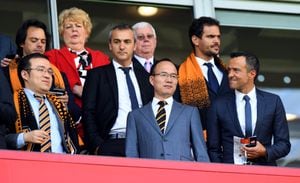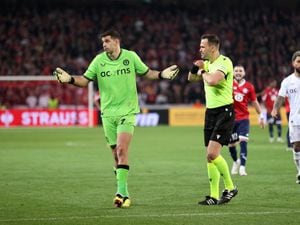Wolves admit financial fair play risk in annual accounts
Wolves have admitted there is a risk of “financial and operational” sanctions as it emerged debt at the club had quadrupled to more than £23.8million for the last season.
The full financial report from the club filed at Companies House reveals that Wolves' parent company W.W. (1990) Ltd recorded a £23.2million loss for the year to 2017 as the club's wage bill rocketed by more than half of the previous season to more than £28m.
It states that Wolves chiefs are keeping a 'month by month' check to mitigate the risk of falling foul of any financial fair play regulations after a spending spree on players and associated fees which is set to rise to £67m by the summer.
But a Wolves spokesperson said tonight: “We remain completely compliant with the EFL’s profit and sustainability rules, and have absolutely no concerns about breaching them in the future."

The full report also reveals the full outlay on players in Wolves' bid to reach the Premier League will add up to some £67m by the summer.
The accounts also show that net debt at the club has soared, from just £4.3m in 2016 to £23.8m by the end of May last year.
That is largely due to loans from parent group Fosun as it bankrolls Wolves' promotion ambitions – some £6m is due to be repaid to Fosun this year and £21m by the end of May next year.
Football's financial fair play regulations cap Championship club losses at £39m over three seasons, but breaching the rules could result in the loss of points, transfer embargoes or fines.
Among the other risks the club is facing is the loss of its Premier League ‘parachute’ payments.
Its final payment last year was £6.9m, down from £13m the year before – heightening the importance of winning promotion to the Premier League at the end of this season.
The impact on the club’s income was immediate, falling from £27.2m in 2016 to £23.8m last year, despite a £1m boost to its gate receipts which rose to £6.5m.
The rest of the club’s income came from sponsorship and advertising, broadcasting rights and commercial activities such as kit sales.

At the same time the cost of running the club has risen substantially. At the end of May last year the club employed 282 people, and the number of playing staff had risen from 69 to 74.
But the cost of wages had soared to £24.9 million, up from £15.9m in 2016, as the club pumped more money into signing top quality players.
The report also reveals Wolves could be required to pay out a further £11.6m based on the club's success and should members of the first team squad make a certain number of appearances for the club or go on to make international appearances.
It will also have included the cost of changing managers four times.
Over a turbulent 2016-17 financial year Wolves sacked Kenny Jackett in July 2016 – shortly after new owners Fosun took over – hired and fired Walter Zenga, replacing him with Paul Lambert until May 2017 at which point current manager Nuno Espirito Santo was brought in. And, of course, there was the cost of their various back room teams.





